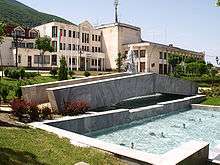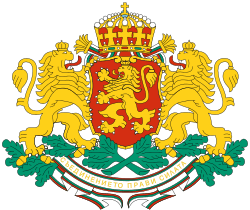Sapareva Banya
| Sapareva Banya Сапарева баня | |
|---|---|
| Town | |
|
Sapareva Banya with the geyser | |
 Sapareva Banya Location of Sapareva Banya | |
| Coordinates: 42°17′N 23°16′E / 42.283°N 23.267°ECoordinates: 42°17′N 23°16′E / 42.283°N 23.267°E | |
| Country | Bulgaria |
| Province (Oblast) | Kyustendil |
| Municipality | Sapareva Banya |
| Government | |
| • Mayor | Sasho Ivanov |
| Elevation | 983 m (3,225 ft) |
| Population (13.09.2005) | |
| • Total | 4,425 |
| Time zone | EET (UTC+2) |
| • Summer (DST) | EEST (UTC+3) |
| Postal Code | 2650 |
| Area code(s) | 0707 |
| License Plate | KH |
| Website | www.saparevabanya.bg |
Sapareva Banya (Bulgarian: Сапарева баня, transliterated Sapareva banya) is a town in southwestern Bulgaria, part of Kyustendil Province. It is located at the north foot of the Rila mountain 15 km east of Dupnitsa. The town is known for its hot mineral (103 °C (217 °F))[1] and clear mountain water, as well as the geyser in the town centre that sprang forth in 1957.
History

The 12th-13th-century St Nicholas Church, the 18th-century St George's Church from the Bulgarian National Revival and the St Forty Martyrs Church from 1859 are located in Sapareva Banya.
The former Roman town of Germane or Germania once stood at the location of modern Sapareva Banya and in the 3rd century was an important town in Dacia province.[2] It was the birthplace of the great Byzantine general Belisarius and was mentioned in the 6th century as Γερμανία, Γερμανός, Γέρμεννε. In an 11th-century charter of Basil II, it was listed as Γερμάνεια. The modern name first appears as Bane in 1576. Later on, it was disambiguated by adding the name of the nearby village of Saparevo: the area is rich in mineral springs and many localities have similar names. Saparevo's name, first attested in 1570, is probably derived from the noun tsapar ("woodchopper"), from the dialectal verb tsaparim (цапарим), "to chop, to cut". Some authors suggest an etymology from the Thracian *Sapara.[3]
Balneotherapy
Mineral water of Separeva banya was highly regarded and used as a cure by Thracians and Romans. Saparevian mineral water is clear, colorless, with smell of hydrogen sulfide, hyperthermal (temperature 103 °C), hydrocarbonate, sulphate-sodium, fluorine, silicon and sulphide. Hydrogen sulfide is 15,5 mg / L. It is claimed that the water treats disorders of the musculoskeletal system, nervous system, and upper respiratory tract, and metal poisoning.[4]
Municipality

Sapareva Banya is also the seat of Sapareva Banya municipality (part of Kyustendil Province), which includes the following 3 villages:
- Ovchartsi
- Resilovo
- Saparevo
Honour
- Saparevo Glacier on Smith Island, South Shetland Islands is named after Saparevo / Sapareva Banya.
- Flavius Belisarius, the famous Roman general, was born in the town which preceded Sapareva Banya.
References
- ↑ Gergov, Spas (1974). Bulgaria. University of Michigan: Naouka i izkoustvo. p. 206.
- ↑ http://www.saparevabanya.bg/
- ↑ Чолева-Димитрова, Анна М. (2002). Селищни имена от Югозападна България: Изследване. Речник (in Bulgarian). София: Пенсофт. p. 164. ISBN 954-642-168-5. OCLC 57603720.
- ↑ Specialized hospital for rehabilitation „Sapareva Banya” JSC in Separeva Banya
External links
| Wikimedia Commons has media related to Sapareva Banya. |
- www.saparevabanya.bg, official municipality website
- Sapareva.hit.bg

.jpg)